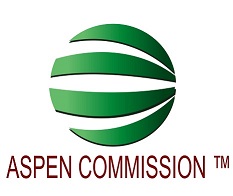ASPEN COMMISSION ™
THE CENTER FOR PHILOSOPHY POLITICS SPIRITUALITY AND SCIENCE ™
Overview Political instability, unchecked crime, and the lack of essential services and economic opportunities in other countries have the potential to create global health crises, drive mass migration to the United States, and inflame violent extremism around the globe. The Department of State and USAID investments in global economic growth and development safeguard U.S. economic and strategic interests, and are visible expressions of U.S. values. Department of State and USAID programs help economies to grow, and countries to open their markets, become potential consumers of U.S. goods and services, and contribute to regional stability. U.S. security and prosperity are bolstered when other countries achieve economic and political stability, resilience, and self-reliance through investments in areas such as food and water security, energy security, good governance, health, education, and economic growth. Economic growth, particularly in developing and transitional economies, serves to strengthen and expand our base of partners, bolster economic opportunities, and build future markets for U.S. exports in the fastest growing regions of the world. Likewise, the United States is made stronger and more secure through Department and USAID programs that connect people, especially women and minorities, to the global economy; build resilience to economic and social stresses in conflict-prone societies; educate and empower citizens; and save children from disease and preventable death. Host country governments, local civil society partners, faith-based organizations, bilateral donors, multilateral organizations, the private sector, and international organizations are committed to achieving results through partnerships, collaboration, and coordination that are more effective. Strong collaboration will optimize resource allocation and reduce fragmentation. Clear host country ownership and priorities, including national or sub-national education plans, enable targeted investments from development partners. A collaborative development approach is critical, especially in cases of acute or protracted crises, widespread displacement, and chronic instability. The Department and USAID will rapidly respond to crises as they arise and coordinate with the ongoing development efforts of other donors. Strategies for Achieving the Objective The Department of State and USAID will support foreign governments, international organizations, and private sector partners to increase access to quality education as a smart development strategy in order to improve economic conditions around the world. To reinforce the educational foundation of growing societies in our partner countries, we will fund programs to ensure crisis-affected children and youth are accessing quality education. RENEW AMERICA’S COMPETITIVE ADVANTAGE FOR SUSTAINED ECONOMIC GROWTH AND JOB CREATION
Promote healthy, educated and productive populations in partner countries to drive inclusive and sustainable development, open new markets and support U.S. prosperity and security objectives By 2022, increase the number of partners engaged with the U.S. to promote and expand cooperation in science, technology and innovation to boost American prosperity. By 2022, support increases in exports of U.S. digital products and services by advocating for regulatory environments that enable cross-border data flows and digital trade, contributing to information and communications technology (ICT) services growing to more than $70 billion. 397 RENEW AMERICA’S COMPETITIVE ADVANTAGE FOR SUSTAINED ECONOMIC GROWTH AND JOBS
|

World Markets
-- Teddy Roosevelt, 26th President of the United States of America
Aspen Commission ™ All Rights Reserved 1996-2025
IBS INTERNATIONAL BOARD OF STANDARDS
Aspen Commission Academy of International Relations, Philosphy Politics and Innovation - International Political Foregin Relations Public Policy Council. The Aspen Commission ™ is an Association Registered in Colorado and is also a listed as an Limited Company CO USA.
CEO Commission Join Mission Ethics Home Continuing Ed Government Jobs Awards Degrees Certification newspapers Diplomacy markets Links Careers Disclaimer
Accreditation and Recognition: GAFM * www.GAFM.org * www.CertifiedProjectManager.eu * www.AAFM.org * Certified Project Manager * Certified e-Commerce Consultant * Royal Law Society * Royal Business Society * Royal Business College * Royal Fellows * Royal Economics Academy * Oxford Law School * AAFM * Certified International Project Manager * www.GMentz.com * www.CertifiedProjectManager.org * www.GeorgeMentz.com * www.AAFM.us * www.icecc.com * www.reclaimingspirituality.com *